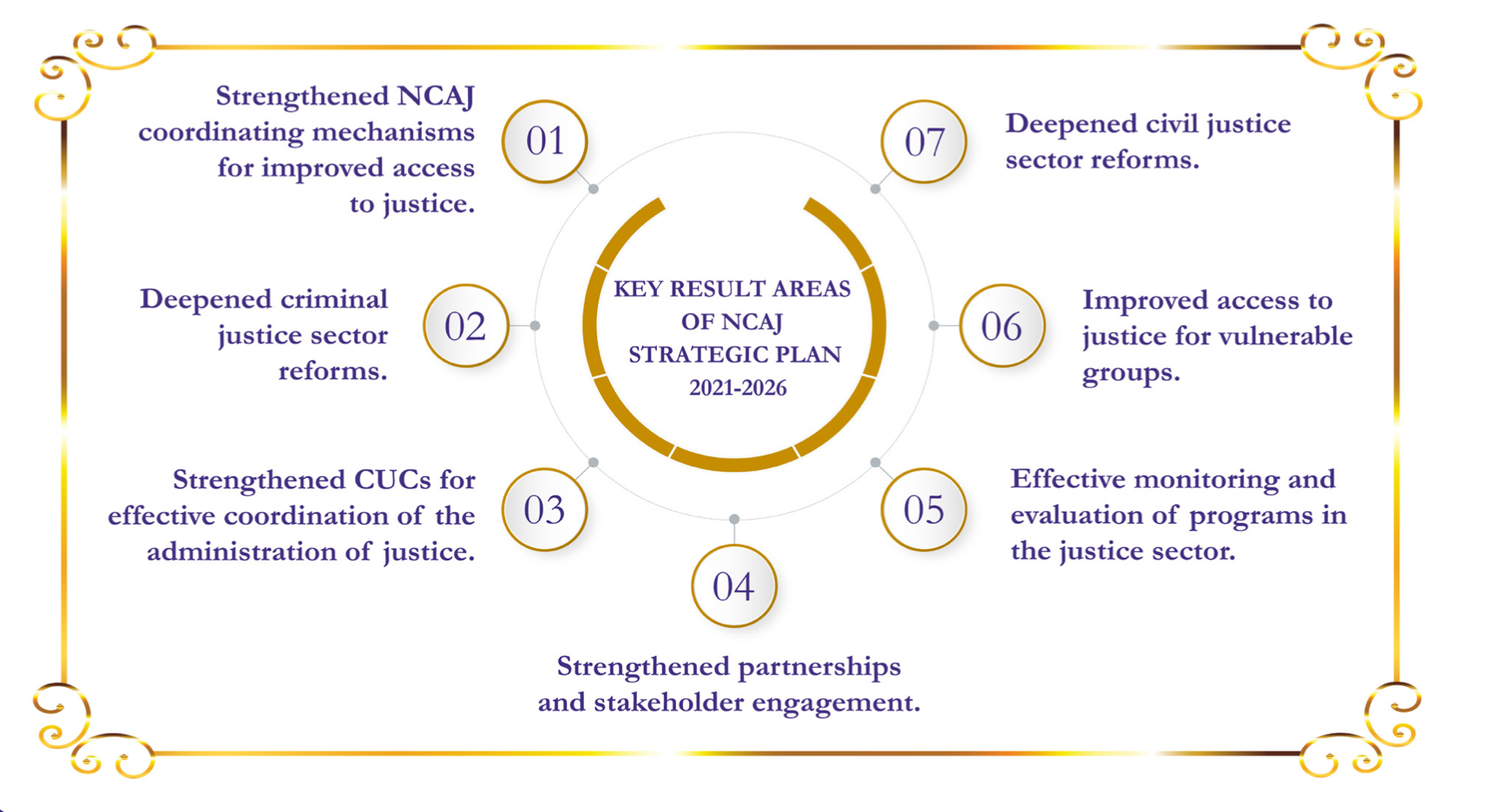NCAJ Strategic Focus Areas
To strengthen coordination and reforms in the justice sector and improve the administration of justice in Kenya, NCAJ has a Strategic Plan (SP) 2021-2026, which provides for strategic priority areas. The priority areas align with SDGs, Kenya’s development agenda articulated in Vision 2030, MTPs and the aspirations of the Judicial Service Act 2011.
The Strategic Plan focuses on efficient coordination of the administration of justice. It emphasizes civil and criminal justice reforms, grassroots administration of justice through CUCs, sectoral monitoring, and access to justice for vulnerable groups.
The NCAJ Strategic Plan has seven Key Result Areas (KRAs). Each KRA has priority programmes and activities covering policy, legal and institutional reforms for efficient and impactful administration of justice.

The overarching mandate of the NCAJ is to ensure a coordinated, efficient, effective, and consultative approach to the administration of justice and reform of the justice sector. While all agencies in the justice sector have distinct mandates, the justice chain requires collaboration and efficient coordination. Through unified and coordinated service delivery and administration of justice, the aspirations of the 2010 Constitution of having a just society will be realized.
The Judicial Service Act provided a broad structure for coordination but left the mechanisms for enhancing coordination within the sector to be determined by the NCAJ Council, chaired by the Chief Justice of the Republic of Kenya. Coordination remains a critical cog in reforming the justice sector to deliver tangible benefits to the citizens of Kenya. To build on the gains made thus far, it is imperative to sustain and strengthen coordination mechanisms within NCAJ by systematizing and aligning the coordination structures. The NCAJ Strategic Plan 2012-2016 prioritizes strengthening the coordination mechanisms.
Criminal justice is one of the most critical aspects of the justice sector. Many citizens come into contact with the justice sector through criminal proceedings, either as accused persons, victims or witnesses. Numerous challenges bedevil adequate access to and delivery of criminal justice in the country. In 2015, the NCAJ commissioned an audit of the criminal justice system. The audit revealed that the criminal justice system disproportionately impacted the poor. Several bottlenecks, including the numerous economic and social-driven petty offences and a high number of poor people being held in remands and prisons, were thus identified. The report, launched in January 2017, made far-reaching recommendations towards reforming the legal and institutional frameworks that govern criminal justice. Subsequently, a Criminal Justice Reforms committee was put in place by NCAJ to oversee the implementation of the audit report.
The role of NCAJ is critical to realize criminal justice reforms as it involves several agencies whose roles interlink. Consequently, the reform process must be driven by multiple institutions. The entire process from investigation, arrest, prosecution, trial, sentencing and implementing custodial or non-custodial sentences needs concerted and coordinated policy, legislative and administrative reforms.
The establishment of CUCs is a statutory responsibility of the Council. The CUCs are a platform that brings together actors and users in the justice sector to enhance public participation and stakeholder engagement, develop a shared understanding of justice sector operations, and build lasting partnerships for a coordinated and consultative approach to the administration of justice.
CUCs have now become an essential organ in the administration of justice across the country. They provide space for discussions amongst the justice actors to enhance collaboration and address local challenges that derail justice. They also serve as crucial avenues for identifying issues that require policy direction from the Council.
While NCAJ brings together on-board state and non-state actors in the justice sector, the success of the administration of justice requires sustained engagement with these stakeholders. The partnerships are essential for the legal and policy reforms in the administration of justice. Legal reforms require collaboration with the national assembly, among other players. Further, partnership aids in mobilising resources for the justice sector.
The justice sector also has an intractable link to the devolved structures. The justice sector serves County Governments that are critical in delivering justice. In 2016, NCAJ signed a memorandum of understanding (MoU) with the Council of Governors (COG) detailing a comprehensive framework for the administration of justice within the context of devolution. Engaging with other partners, such as the media and development partners, is critical to support the NCAJ reform agenda and efficient administration of justice.
Effective coordination of the justice sector requires data collection, analysis and dissemination. One value-addition of NCAJ to its member agencies is being the repository of up-to-date and accurate information on various issues within the sector. Data inform policy-making and action for stakeholders within the justice sector and the wider Government. Recognizing the importance of centralized data collection and data-led decision-making, NCAJ seeks to prioritize improving its M&E systems and frameworks. The System and framework will ensure that justice sector decisions are evidence-based.
In enhancing coordination in the justice sector, NCAJ has continued to pay attention to the needs of vulnerable groups. The Constitution of Kenya commits to ensuring that all people enjoy the promise of an open and democratic society. Article 10 commits to social justice, equity, human dignity, non-discrimination, inclusiveness, equality, human rights and protection of the marginalised as national values and principles of governance. Thus, the administration of justice always aspires to address the plight of the vulnerable members of society.
The NCAJ has a working committee to ensure the efficient administration of child justice. Further, it has a working committee to address challenges in the administration of justice related to SGBV. The aim is to ensure that the justice sector is inclusive and serves the needs of all segments of society by paying particular attention to those most vulnerable and neglected.
Civil justice is a branch of law that deals with resolving disputes between individuals and/or organisations, to achieve a fair solution when they have been injured or harmed due to another person’s negligence, recklessness, or malpractices. Civil justice has three components, namely; institutional, professional, and procedural. In Kenya, the critical actors in the civil justice system include; the Judiciary, which resolves or adjudicates disputes when they arise, and the Attorney General, who represents the government in all civil cases as stipulated in section 5(1) (i) of the Act. No. 49 of 2012, other State actors, as well as non-State actors, operate within the various mechanism of administration of justice. Ultimately, the intention is to ensure that the citizenry, the claimants and/or the respondents in any civil claim can access justice effectively and promptly.
As part of its functions, the NCAJ focused on reforms to address the challenges and emerging issues in the administration of civil justice to complement the various activities undertaken in the criminal justice sector and other areas. The Council has established a Working Committee, Chaired by the Hon. Attorney General, to spearhead Civil Justice Reforms.

